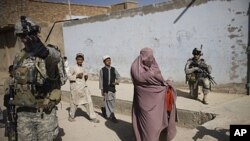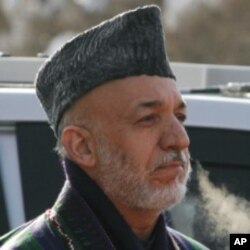Even as the fighting still rages in Afghanistan, some preliminary talks have been taking place between U.S. and Taliban representatives.
The talks, which cannot be labeled negotiations, have reportedly focused only on Taliban demands for a release of prisoners in U.S. custody. But with 2014 looming as a U.S. combat troop withdrawal date, a political settlement of the conflict in Kabul is clearly on all sides’ minds.
The United States has repeatedly said it supports what it calls an “Afghan-led peace process.” According to former CIA officer Bruce Riedel, who chaired the Obama administration’s 2009 review of Afghan policy, the United States has nothing to lose by supporting a political settlement of the conflict.
"We should not be the ones against a political approach," said Riedel. "If there is no viable political outcome, let it not be because the United States is the one that said no. Let’s find out if there is a basis for political accommodation between the Karzai government and the Taliban insurgency."
But Riedel called the prospects for compromise between the Taliban and the government of President Hamid Karzai slim. The Taliban view the Karzai administration as an illegitimate creation of the United States and its allies. And it is only interested in talking with the United States, the main party to the conflict, said Francesc Vendrell, former European Union special envoy on Afghanistan.
"They do not want to negotiate with Karzai. And Karzai is helping them by almost sabotaging what the Americans are trying to do," Vendrell said. "There is a kind of unholy race between the two governments as to who is going to be first really talking to the Talibs, which must make the Talibs very amused and rather happy."
If real peace negotiations do get off the ground, what do the players hope to gain?
An Afghan affairs analyst with the private conflict resolution group Swisspeace, Can Deniz, believes the Taliban want all foreign forces out of Afghanistan, and the United States and NATO are looking for a safe exit for its forces.
"One of the main goals, I think, of these peace negotiations is to ensure that the withdrawing troops will not be attacked by the insurgents," Deniz said. "So this office built up in Qatar recently is, I think, is to negotiate the orderly withdrawal of the troops and to ensure that they are not being attacked by insurgent groups."
And that could be a starting point for the negotiations, said David Cortright, policy studies director for Notre Dame University’s Kroc Institute for International Peace Studies.
"We say we’re going to end the combat operations. So why do not we make that part of a negotiation? We could offer it to the Taliban representatives that we are supposedly beginning to talk to now, offer to them that we will suspend drone strikes, house raids, combat operations if you’ll do the same," he said. "And then we could sit down and talk about what kind of a coalition, what kind of a power-sharing arrangement will be sufficient to satisfy all the parties there and end all the violence."
But on the political side of the ledger, whether the Taliban want to enter into some kind of power-sharing arrangement in postwar Afghanistan is not clear. Given their antipathy towards Karzai, many analysts believe they will balk at having to join a coalition government with him.
Former EU envoy Francesc Vendrell, who knows President Karzai well, points out that the Afghan president has proven to be a difficult and often uncooperative partner for the U.S. and its allies. Vendrell said he would not be at all surprised if the United States loses patience with him - or already has - and would cut a separate deal to facilitate the troop withdrawal.
"He has not got his act together. He has not got a proper negotiating team. He has not reached any kind of consensus or understanding with the northern opposition [alliance], with the other political elite in Kabul. So I would not be too surprised if the Americans eventually reach an agreement with the Taliban, like the Soviet Union did in ’89, or how the Americans did with North Vietnam at the back of the South Vietnamese government in 1973," said Vendrell.
But neighboring Pakistan, where the Taliban take refuge, cannot be shut out of any peace process, said David Cortright. Echoing other analysts and Western officials, Cortright said Pakistan's military and intelligence service have backed the Taliban in order maintain strategic influence in Afghanistan.
"Much as we may not like it, but they have been the paymasters and the controllers of the Taliban for many years. There is no secret, everybody knows that. And if they are not brought in they will continue to spoil and undermine the peace process. They have done that several times already. They have arrested Taliban interlocutors who have been there to speak with the Americans or with Karzai. They want a piece of the action. And if we want to end the war we’re going to have to bring them in somehow."
Analysts warn that without a comprehensive political settlement satisfying all parties, Afghanistan could again descend into the kind of civil war that gripped the country in the 1990s.





